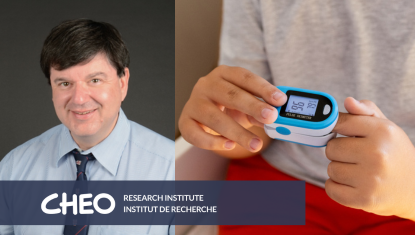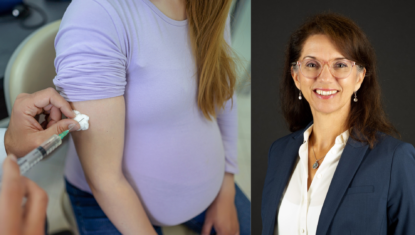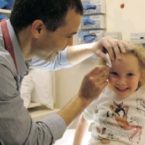Although COVID-19 can be considered both an infectious disease and a respiratory disease, we recognize that many people are interested in all research pertaining to COVID-19. The content below is the collective contributions of news stories, research projects and researchers from the CHEO Research Institute related to COVID-19.
We are also pleased to provide a Pediatric COVID-19 Research in Canada database that is updated regularly. If you would like to access the database or add any studies you or your team are working on, please follow this link: https://pediatrics.knack.com/covid-research-database#home/. Learn more about this project here
Related News
-

16/01/2024
Commercial pediatric fingertip devices and smartphone applications used to measure oxygen saturation not recommended for infants
-

09/03/2023
The kids are not alright: Emergency department visits for attempted suicides rose globally among youth during pandemic
-

29/08/2022
New research shows no link between COVID-19 vaccination during pregnancy and higher risk of preterm birth or stillbirth
Research Projects
-
Sleep duration change among adolescents in Canada: Examining the impact of COVID-19 in worsening inequity.
04/08/2023
The purpose of this analysis was to assess which sub-population (based on interactions of race/ethnicity, sex/gender, socioeconomic indicators, and urbanicity) experienced larger change in sleep behaviours from 2019 to 2020 (before the onset of the pandemic) to the 2020–2021 school year (during the 2nd and 3rd waves of the COVID-19 pandemic in Canada (Wu et al., 2021)) in a prospective cohort of adolescents living in Canada. We expected that the COVID-19 pandemic would worsen inequities so the sleep duration gains would be less seen in racialized adolescents, girls, and those coming from lower SES backgrounds.
-
Gaps in childhood immunizations and preventive care visits during the COVID‐19 pandemic: a population‐based cohort study of children in Ontario and Manitoba, Canada, 2016-2021
13/07/2023
We aim to quantify differences in immunization and preventive care visits completed before 12 months of age, and between 12 and 24 months of age, for children post COVID-19 pandemic onset, compared to children before pandemic onset in two Canadian provinces, Manitoba (population ~1.4 million) and Ontario (population ~15 million). We capture immunization and well-child visit rates up until September 2021. Due to the disrupted delivery of services, we hypothesized that the proportion of infants and children who received all vaccines or well-child visits would be lower if they were exposed to the pandemic compared to unexposed infants and children. Our secondary objective was to describe and quantify changes in the receipt of individual vaccines and well-child visits.
-
Meeting the service needs of youth with and without a self-reported mental health diagnosis during COVID-19
01/05/2023
The COVID-19 pandemic has introduced multiple, co-occurring stressors for youth, such as drastic changes to their daily routines, social interactions, and educational conditions (1,2). Relative to other life stages, adolescence is a critical period of social and emotional development (3), and one in which mental health (MH) and substance use disorders are more likely to emerge in the face of overwhelming change (4). For many youth, it seems that the MH impacts from COVID-19 have been detrimental (5–8). For others, their MH may not have changed, or even improved, due to fewer social or school-related pressures or increases in family bonding (9–12). For youth with existing MH concerns, diagnoses or risk factors, the MH effects of the pandemic may have been especially harmful (9,13,14), particularly for those whose access to services has been discontinued or disrupted (13).
-
Pediatric emergency department physicians’ perceptions of virtual mental health assessments for urgent needs
07/02/2023
While many physicians agreed that there is a potential benefit of the ED virtual care platform for urgent mental health assessments, time constraints and lack of confidence in providing satisfactory virtual mental health care with minimal mental health support limited its acceptability. These findings can inform the future implementation of mental health services using an innovative virtual ED platform.
-
Virtual Family-Centered Rounds During the COVID-19 Pandemic – Technology Usability Analysis
06/10/2022
-
Sociodemographic and mental health characteristics associated with changes in movement behaviours due to the COVID-19 pandemic in adolescents
02/10/2022
Ongoing efforts continue to be made to understand the potential impacts of COVID-19-related preventative public health measures. This large cross-sectional study is among the first to describe the sociodemographic and mental health characteristics of Canadian adolescents in relation to perceived changes in movement behaviours during the months immediately following introduction of lockdown measures. The survey capturing responses of students across Ontario, Quebec, and British Columbia (Canada) found that a perceived increase in screen time as a result of the pandemic was highly prevalent, with social media increase among females compared to males having the largest effect size among gender-based comparisons of movement behaviour changes.
-
Nasopharyngeal swabs vs. saliva sampling for SARS-CoV-2 detection: A cross-sectional survey of acceptability for caregivers and children after experiencing both methods
08/07/2022
Though most youth find saliva sampling painless and prefer it to nasopharyngeal swabs, primary decision makers present for the experience generally remain accepting of both methods for COVID-19 testing.
-
Maternal-Newborn Health System Changes and Outcomes in Ontario Canada during Wave 1 of the COVID-19 Pandemic-A Retrospective Study
01/06/2022
Wave 1 of the COVID-19 pandemic led to system-level and clinical practice changes in Ontario maternal-newborn settings. Importantly, there is no evidence that these changes resulted in any contemporaneous increase in adverse perinatal outcomes, including stillbirth and preterm birth.
-
Association of SARS-CoV-2 Infection During Pregnancy with Maternal and Perinatal Outcomes
24/05/2022
In this exploratory surveillance study conducted in Canada from March 2020 to October 2021, SARS-CoV-2 infection during pregnancy was significantly associated with increased risk of adverse maternal outcomes and preterm birth.
-
Research priorities to reduce the impact of COVID-19 in low- and middle-income countries
14/05/2022
This study represents an attempt to generate and systematically score research priorities to address COVID-19 across LMICs.
-
Parenting during the COVID-19 pandemic: The sociodemographic and mental health factors associated with maternal caregiver strain
03/01/2022
Introduction: The COVID-19 pandemic has introduced new stressors for parents (“caregivers”) that may affect their own and their child’s mental health (MH). We explored self-reported levels of caregiver strain (parents’ perceived ability to meet parenting demands), and the MH and sociodemographic factors of caregivers to identify predictors of strain that can be used to guide MH service delivery for families.
-
Evaluating how has care been affected by the Ontario COVID-19 Opioid Agonist Treatment Guidance: Patients’ and prescribers’ experiences with changes in unsupervised dosing
23/12/2021
Results support the need to re-evaluate historical approaches to OAT care delivery, particularly unsupervised doses. It is crucial to implement policies, regulations, and supports to reduce barriers to OAT care during the pandemic and once the pandemic response restrictions are eased. Flexibility in OAT care delivery, particularly unsupervised dosing, will be key to providing patient-centered care for persons with opioid use disorder.
-
Virtual family-centered rounds: A collaborative necessity during COVID-19 and beyond
29/10/2021
We believe this virtual care model is both highly relevant and transferable to a variety of health care settings across Canada and beyond.
-
Near real-time determination of B. 1.1. 7 in proportion to total SARS-CoV-2 viral load in wastewater using an allele-specific primer extension PCR strategy
15/10/2021
Our study demonstrates that this strategy can provide public health units with an additional and much needed tool to rapidly triangulate VOC incidence/prevalence with high sensitivity and lineage specificity.
-
The role of wastewater testing for SARS-CoV-2 surveillance
26/08/2021
These characteristics of SARS-CoV-2 infection, along with the observation that SARSCoV-2 is excreted in stools during all phases of infection, has led to the uptake of wastewater testing to complement SARS-CoV-2 surveillance based on clinical tests and case identification.
-
Epidemiologic and clinical characteristics of multisystem inflammatory syndrome in adults: a rapid review
04/08/2021
Further studies to improve our understanding of pathogenesis of MIS-A will help improve treatment decisions and prevent sequelae and death.
-
Psychological and Demographic Determinants of Substance Use and Mental Health During the COVID-19 Pandemic
25/06/2021
These characteristics should be considered when developing prevention and treatment programs for adults with problematic alcohol use and comorbid anxiety and depression.
-
Aerosol SARS-CoV-2 in hospitals and long-term care homes during the COVID-19 pandemic
04/06/2021
Although a subset of aerosol samples exhibited detectable SARS-CoV-2 RNA at low titres, the presence of viable SARS-CoV-2 virus in aerosols appears to be infrequent at >2m distance.
-
The impact of COVID-19 on adolescents with eating disorders: a cohort study
04/06/2021
Further research is required to better understand the impact of the pandemic on the clinical course and outcomes of EDs in adolescents.
-
Evaluating the utility of synthetic COVID-19 case data
01/03/2021
A privacy risk assessment on the synthetic data showed that the attribute and membership disclosure risks were low.
-
SARS-CoV2 Infection in Children with Liver Transplant and Native Liver Disease: An International Observational Registry Study
16/02/2021
Future controlled studies are needed to evaluate effective treatments and further stratify LD and LT patients with SARS-CoV2 infection.
-
Catching a resurgence: Increase in SARS-CoV-2 viral RNA identified in wastewater 48 hours before COVID-19 clinical tests and 96 hours before hospitalizations
22/01/2021
Wastewater-based COVID-19 epidemiology programs have been initiated in many countries to provide public health agencies with a complementary disease tracking metric and non-discriminating surveillance tool.
-
Predicting SARS-CoV-2 infections for children and youth with single symptom screening
01/01/2021
Symptom-based screening needs to be responsive to changes in evidence and local factors, including the expected resurgence of other respiratory viruses following relaxation of social distancing/masking, to reduce infection-related risks in schools and daycare settings.
-
Regional differences in access to the outdoors and outdoor play of Canadian children and youth during the COVID-19 outbreak
18/12/2020
It is unsurprising that in the provinces that have had the highest number of COVID-19 cases, there have been the most stringent restrictions on access to the outdoors. It is also unsurprising that these same provinces have had the greatest decline in time spent outdoors and in outdoor play among children and youth.
-
Evaluating Identity Disclosure Risk in Fully Synthetic Health Data: Model Development and Validation
11/11/2020
We have presented a comprehensive identity disclosure risk model for fully synthetic data. The results for this synthesis method on 2 datasets demonstrate that synthesis can reduce meaningful identity disclosure risks considerably. The risk model can be applied in the future to evaluate the privacy of fully synthetic data.
-
Healthy movement behaviours in children and youth during the COVID-19 pandemic: Exploring the role of the neighbourhood environment
01/09/2020
This paper explores patterns of increased/ decreased physical activity, sedentary and sleep behaviours among Canadian children and youth aged 5-17 years during the COVID-19 pandemic, and examines how these changes are associated with the built environment near residential locations.
-
SARS-CoV-2 Protein in Wastewater Mirrors COVID-19 Prevalence
01/09/2020
Here, we demonstrate the presence of SARS-CoV-2 structural proteins in wastewater using traditional immunoblotting and quantitate them from wastewater solids using an immuno-linked PCR method called Multiplex Paired-antibody Amplified Detection (MPAD). In this longitudinal study, we corrected for stochastic variability inherent to wastewater-based epidemiology using multiple fecal content protein biomarkers.
-
Quantitative analysis of SARS-CoV-2 RNA from wastewater solids in communities with low COVID-19 incidence and prevalence
19/08/2020
Can we find COVID-19 markers in the wastewater that will help predict outbreaks?
-
Decontamination Interventions for the Reuse of Surgical Mask Personal Protective Equipment: A Systematic Review
10/08/2020
There is limited evidence on the safety or efficacy of surgical mask decontamination. Given the heterogeneous methods used in studies to date, we are unable to draw conclusions on the most efficacious and safe intervention for decontaminating surgical masks.
-
Decontaminating N95 and SN95 masks with Ultraviolet Germicidal Irradiation (UVGI) does not impair mask efficacy and safety: A Systematic Review
17/07/2020
In conclusion, the function of N95 masks, based on aerosol penetration and airflow filtration, is maintained following a single cycle of UVGI. Decontamination using UV light in the laboratory setting suggests that this can be a successful method of removing infectious pathogens from FFRs. Future studies should use a cumulative UV-C dose of 40,000 J/m2 and focus on validating the effectiveness of UVGI decontamination in the real-world setting, and on determining the impact of UVGI on mask fit as well as the maximum number of UVGI cycles that can be safely applied to an N95 FFR.
-
Decontaminating N95 and SN95 masks with ultraviolet germicidal irradiation does not impair mask efficacy and safety.
13/07/2020
To help inform FFR-reuse policies and procedures, our team has conducted three systematic reviews to synthesize existing published data regarding the effectiveness of UVGI, heat, microwave irradiation, and chemical disinfectants for N95 FFR decontamination.
-
Canadian children’s and youth’s adherence to the 24-h movement guidelines during the COVID-19 pandemic: A decision tree analysis
08/07/2020
Our results show that specific characteristics interact to contribute to (non)adherence to the movement behavior recommendations. Results highlight the importance of targeting parents’ perceived capability for the promotion of children's and youth's movement behaviors during challenging times of the COVID-19 pandemic, paying particular attention to enhancing parental perceived capability to restrict screen time.
-
Impact of the COVID-19 virus outbreak on movement and play behaviours of Canadian children and youth: a national survey
06/07/2020
This study provides evidence of immediate collateral consequences of the COVID-19 outbreak, demonstrating an adverse impact on the movement and play behaviours of Canadian children and youth. These findings can guide efforts to preserve and promote child health during the COVID-19 outbreak and crisis recovery period, and to inform strategies to mitigate potential harm during future pandemics.
-
Seeking Normalcy as the Curve Flattens: Ethical Considerations for Pediatricians Managing Collateral Damage of Coronavirus Disease-2019
26/06/2020
Children have encountered and will continue to encounter unique challenges as the COVID-19 pandemic continues. We cannot ignore discrepancies in social determinants of health. Keeping families and communities safe and our patients healthy is no small task. But we have an opportunity, if we pay close attention to the vulnerabilities exposed by this pandemic, to make conditions better for children than before the pandemic began.
-
SuperNurse? Troubling the Hero Discourse in COVID Times
13/06/2020
Childlike, our society and its leaders have chosen SuperNurse as the favourite toy of the day. She serves as a temporary distraction for fears and anxieties that have become more acute within the context of COVID-19’s powerful lesson: our health is deeply connected to that of others, animals and the earth. The already overflowing waste bin remains poised in the background.
-
New Data regarding decreased physical activity during the Global Pandemic
01/06/2020
The time spent in places associated with physical activity such as parks, beaches, and community gardens was down by 31%, and travel by public transport, which is also associated with physical activity, was down by 59%.
-
Paediatric ethical issues during the COVID‐19 pandemic are not just about ventilator triage
01/05/2020
the COVID‐19 pandemic is creating many ethical challenges. One of the most difficult is for ethicists to focus on the issues that are likely to have the greatest impact. Ventilator allocation in a crisis situation is a deeply tragic choice that requires careful balancing of a number of values
-
Efficacy and Safety of Disinfectants for Decontamination of N95 and SN95 Filtering Facepiece Respirators: A Systematic Review
18/04/2020
Aim:The objective of this review was to synthesize existing data on the effectiveness and safety of using disinfectants to decontaminate N95 FFR.
-
Decontaminating N95 masks with Ultraviolet Germicidal Irradiation (UVGI) does not impair mask efficacy and safety: A Systematic Review
10/04/2020
Microwave irradiation and heat provides safe and effective decontamination options for N95 FFR reuse during critical shortages. However, autoclaving masks is not recommended by the evidence in this review. Any mask disinfected using these methods should be inspected for physical degradation before reuse.
-
Researching COVID-19 Community Markers in Wastewater
This is an active study.
Researchers
-
Tommy Michel Alain
Senior Scientist, CHEO Research Institute
-
Maala Bhatt
Scientist, CHEO Research Institute
-
Private: Samantha Boggs
Investigator, CHEO Research Institute
-
Natalie Bresee
Investigator, CHEO Research Institute
-
Melanie Buba
Investigator, CHEO Research Institute
-
Mario Cappelli
Investigator, CHEO Research Institute
-
Jean-Philippe Chaput
Senior Scientist, CHEO Research Institute
-
Paula Cloutier
Investigator, CHEO Research Institute
-
Rochelle Einboden
Scientist CHEO, Research Institute
-
Dina El Demellawy
Investigator, CHEO Research Institute
-
Khaled El Emam
Senior Scientist, CHEO Research Institute Professor, Faculty of Medicine, University of Ottawa
-
Andrea Evans
Investigator, CHEO Research Institute
-
Deshayne Fell
Affiliate Investigator, CHEO Research Institute
-
Private: William Gardner
Senior Scientist, CHEO Research Institute
-
Gary Goldfield
Senior Scientist, CHEO Research Institute
-
Tyson Graber
Associate Scientist
-
Stuart Harman
Investigator, CHEO Research Institute
-
Megan Harrison
Investigator, CHEO Research Institute
-
Mohit Kehar
Investigator, CHEO Research Institute
-
Allison Kennedy
Investigator, CHEO Research Institute
-
Tom Kovesi
Investigator, CHEO Research Institute
-
Eric LaCasse
Associate Scientist, CHEO Research Institute
-
Alex MacKenzie
Senior Scientist, CHEO Research Institute
-
Dayre McNally
Senior Scientist, CHEO Research Institute
-
Gregory Moore
Investigator, CHEO Research Institute
-
Mark Norris
Investigator, CHEO Research Institute
-
Katie O’Hearn
Investigator, CHEO Research Institute
-
Nicole Obeid
Scientist, CHEO Research Institute
-
Kathleen Pajer
Senior Scientist, CHEO Research Institute
-
Anne Pham-Huy
Investigator, CHEO Research Institute
-
Christine Polihronis
Investigator, CHEO Research Institute
-
Amy Porath
Investigator, CHEO Research Institute
-
Nicole Racine
Scientist, CHEO Research Institute
-
Ashley Radomski
Associate Scientist, CHEO Research Institute
-
Sarah Reid
Investigator, CHEO Research Institute
-
Nicole Sheridan
Investigator, CHEO Research Institute
-
Wendy Spettigue
Investigator, CHEO Research Institute
-
Ann Sprague
Investigator, CHEO Research Institute
-
Mark S. Tremblay
Senior Scientist, CHEO Research Institute
-
Sandy Tse
Investigator, CHEO Research Institute
-
Richard Webster
Investigator, CHEO Research Institute
-
Roger Zemek
Senior Scientist, CHEO Research Institute










































